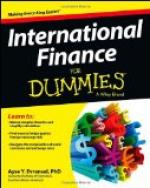To take a practical example, let us suppose that the King of Ruritania is informed by his Minister of Marine that a battleship must at once be added to its fleet because his next door neighbour is thought to be thinking of making himself stronger on the water, while his Minister of Finance protests that it is impossible, without the risk of serious trouble, to add anything further to the burdens of the taxpayers. A loan is the easy and obvious way out. London and Paris between them will find two or three millions with pleasure. That will be enough for a battleship and something over in the way of new artillery for the army which can be ordered in France so as to secure the consent of the French Government, which was wont to insist that a certain proportion of any loan raised in Paris must be spent in the country. (It need hardly be said that all these events are supposed to be happening in the years before the war.) Negotiations are entered into with a group of French banks and an English issuing house. The French banks take over their share, and sell it to their customers who are, or were, in the habit of following the lead of their bankers in investment with a blind confidence, that gave the French banks enormous power in the international money market. The English issuing house sends round a stockbroker to underwrite the loan. If the issuing house is one that is usually successful in its issues, the privilege of underwriting anything that it brings out is eagerly sought for. Banks, financial firms, insurance companies, trust companies and stockbrokers with big investment connections will take as much underwriting as they are offered, in many cases without making very searching inquiry into the terms of the security offered. The name of the issuing house and the amount of the underwriting commission —which we will suppose in this case to be 2 per cent.—is enough for them. They know that if they refuse any chance of underwriting that is offered, they are not likely to get a chance when the next loan comes out, and since underwriting is a profitable business for those who can afford to run its risks, many firms put their names down for anything that is put before them, as long as they have confidence in the firm that is handling the loan. This power in the hands of the big issuing houses, to get any loan that they choose to father underwritten in a few hours by a crowd of eager followers, gives them, of course, enormous strength and lays a heavy responsibility on them. They only preserve it by being careful in the use of it, and exercising great discrimination in the class of securities that they handle.




